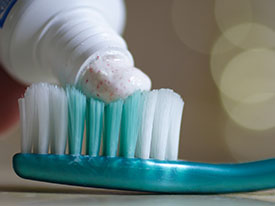 |
| photo: Thegreenj on Wikimedia Commons |
Microbeads are comprised of tiny particles of plastic, e.g. polyethylene, polypropylene, polyethylene terephthalate, and polymethyl methacrylate. They are added to toiletry products such as facial scrubs, body washes, and toothpastes as an abrasive to help clean and exfoliate.
They do not biodegrade and can bind to other pollutants, creating an even greater hazard. Once released to surface waters, they are often mistaken by fish as food and are ingested. They can then work themselves up the food chain, by being consumed by larger predators, including humans. Some studies are showing health impacts to wildlife that consume micro- plastics (Nature.com, published November 21, 2013)
Created in the 1970s, they are now found in hundreds of products, including those used for personal care. The problem of microbeads and water pollution was not raised until the publication of a 2009 study by Fendall and Sewell demonstrating that these small particles directly enter the marine environment from households. Following that, a Dutch organization of environmental experts, the North Sea Foundation, started requesting companies to stop adding microbeads to their products in 20011; and along with the Plastic Soup Foundation, launched the Beat the Microbead international campaign.
Although many companies have already voluntarily pledged to stop using microbeads, the U.S. ban establishes deadlines that will accelerate the process. Hopefully other countries will follow suit. This ban is one positive step to controlling the pervasive plastic pollution in the worlds oceans. In the meantime, to know whether or not a product contains microbeads, there is a Beat the Microbead App which can be downloaded at http://beatthemicrobead.org/en/.
No comments:
Post a Comment